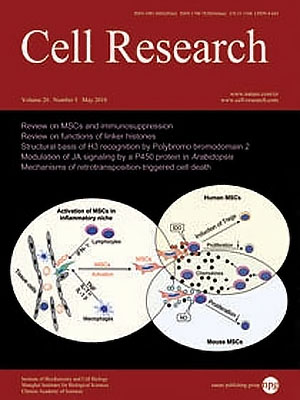
Volume 20, No 5, May 2010
ISSN: 1001-0602
EISSN: 1748-7838 2018
impact factor 17.848*
(Clarivate Analytics, 2019)
Volume 20 Issue 5, May 2010: 539-552
ORIGINAL ARTICLES
The Arabidopsis P450 protein CYP82C2 modulates jasmonate-induced root growth inhibition, defense gene expression and indole glucosinolate biosynthesis
Fang Liu1, Hongling Jiang1, Songqing Ye2, Wen-Ping Chen2, Wenxing Liang1, Yingxiu Xu11, Bo Sun3, Jiaqiang Sun1, Qiaomei Wang3, Jerry D Cohen2 and Chuanyou Li1
1State Key Laboratory of Plant Genomics, National Centre for Plant Gene Research, Institute of Genetics and Developmental Biology, Chinese Academy of Sciences, No.5 Datun Road, Chaoyang District, Beijing 100101, China;
2Department of Horticultural Science and Microbial and Plant Genomics Institute, University of Minnesota, Saint Paul, MN 55108, USA;
3Department of Horticulture, Zhejiang University, Hangzhou 310029, China
Correspondence: Chuanyou Li,(cyli@genetics.ac.cn)
Jasmonic acid (JA) is a fatty acid-derived signaling molecule that regulates a broad range of plant defense responses against herbivores and some microbial pathogens. Molecular genetic studies have established that JA also performs a critical role in several aspects of plant development. Here, we describe the characterization of the Arabidopsis mutant jasmonic acid-hypersensitive1-1 (jah1-1), which is defective in several aspects of JA responses. Although the mutant exhibits increased sensitivity to JA in root growth inhibition, it shows decreased expression of JA-inducible defense genes and reduced resistance to the necrotrophic fungus Botrytis cinerea . Gene cloning studies indicate that these defects are caused by a mutation in the cytochrome P450 protein CYP82C2. We provide evidence showing that the compromised resistance of the jah1-1 mutant to B . cinerea is accompanied by decreased expression of JA-induced defense genes and reduced accumulation of JA-induced indole glucosinolates (IGs). Conversely, the enhanced resistance to B. cinerea in CYP82C2-overexpressing plants is accompanied by increased expression of JA-induced defense genes and elevated levels of JA-induced IGs. We demonstrate that CYP82C2 affects JA-induced accumulation of the IG biosynthetic precursor tryptophan (Trp), but not the JA-induced IAA or pathogen-induced camalexin. Together, our results support a hypothesis that CYP82C2 may act in the metabolism of Trp-derived secondary metabolites under conditions in which JA levels are elevated. The jah1-1 mutant should thus be important in future studies toward understanding the mechanisms underlying the complexity of JA-mediated differential responses, which are important for plants to adapt their growth to the ever-changing environments.
Cell Research (2010) 20:539-552. doi:10.1038/cr.2010.36; published online 30 March 2010
FULL TEXT | PDF
Browse 2399


